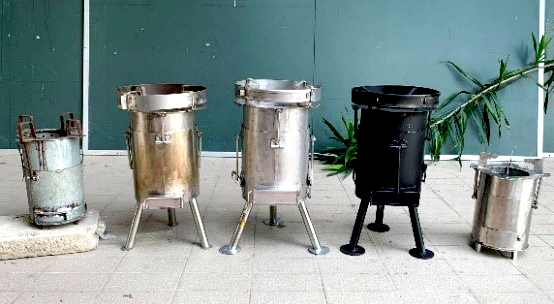Energy-saving Biomass Stove for Herb Processing of the Wat Khu Tao Moral Herbal Community Enterprise, Songkhla Province
Main Article Content
Abstract
The moral herbal community enterprise, Wat Khu Tao, in Songkhla Province, processes herbs for use in Bang Klam Hospital and Community. The former use of traditional stoves and gas cooking stoves resulted in high cost of fuel and production costs. This research, therefore, enhances the quality of the herbal production process of community enterprise by using the technology of energy saving-stove. Processes are as follows: 1) Study of the theory and technology of energy-saving biomass stove; 2) Design and development of energy-saving stove prototype; 3) Development of energy-saving stove technology, and 4) Analysis of thermal efficiency of the energy-saving prototype. The community participated in material preparation and functional testing. The result of the operation shows that the extraction and simmering of herbs took only 40 minutes per time. The production potential of Na Hom Fung Chao balm has increased to 5,400 bottles per month, generating an income of approximately 45,000 baht per month for the community enterprises. Additionally, the creation of a systematic herbal processing network increased to 30 community enterprise members. The application of energy-saving stove technology is also for boiling healthy herbal drinks, which leads to the establishment of a health learning network. In conclusion, the project has successfully promoted energy saving in herb processing, reducing environmental pollution from burning biomass, and passing on the local wisdom to the next generation.
Article Details

This work is licensed under a Creative Commons Attribution-NonCommercial-NoDerivatives 4.0 International License.
Area Based Development Research Journal values copyright protection and licensing to safeguard author rights and facilitate the appropriate dissemination of research. Our policies ensure openness, accessibility, and attribution. Authors retain copyright ownership, and articles are published under a Creative Commons Attribution License (CC BY), allowing sharing, adaptation, and proper attribution. Authors have the freedom to publish under the CC BY license, granting broad reuse and distribution permissions. The journal supports posting articles on third-party repositories, adhering to institutional and funding restrictions. Author guidelines detail copyright and licensing requirements, empowering authors with knowledge about their rights and responsibilities. These policies cultivate an environment of collaboration, openness, and responsible sharing, benefiting authors and the research community while honoring intellectual property rights.
References
Bangkokbiznew. (2017). Thai herb. Retrieved November 15, 2019, from: https://www. Bangkokbiznew./pr/detail/29932. (in Thai).
Bhattacharya, S. C., & Salam, P. A. (2002). Low greenhouse gas biomass options for cooking in the developing countries. Biomass and Bioenergy, 22(4), 305-317.
Berrueta, V. M., Edwards, R. D., & Masera, O. R. (2008). Energy performance of wood-burning cookstoves in Michoacan, Mexico. Renewable Energy, 33(5), 859-870.
Chaichana, T., Ali, M., & Longsaman, M. (2012). The study of thermal efficiency of household cooking stove. Journal of Science and Technology Mahasarakham University, 32(5), 626-630. (in Thai).
Charoenboon, W. (2014). Rice husk gasifier stove-energy for Thai agriculturalist. KKU Science Journal, 45(1), 163-174. (in Thai).
Jaitong, W., & Wongsiriwittaya, M. (2018). The direct effect combustion of biomass in burner system by compressed air from the centrifugal blower. Thaksin University Journal, 21(3), 191-198. (in Thai).
Khaonuan, P., Prasongchan, S., & Bordeepong, S. (2020). Performance development of household biomass TLUD cookstove. UTK Research Journal, 14(1), 52-62. (in Thai).
Namkham, N. (2017). Efficiency evaluationon biomass furnace combustion chamber of refractory insulation. NSRU Science and Technology Journal, 9(9), 37-49. (in Thai).
Office of the Permanent Secretary for Energy. (2007). Energy training manual for community energy technology. Bangkok: Ministry of Energy. (in Thai).
Prasongchan, S., Khaonuan, P., & Wunsri, S. (2018). Technology of the TLUD biomass cookstove for energy saving and the integrated community development for sustainability. In the 28th Thaksin University National Academic Conference, Songkhla. (in Thai).
Tangngam, C., Siwakosit, W., & Ayawat, K. (2012). Design of a three-stage with rice husk as a fuel. In the 49th Kasetsart University Conferrence, Bangkok. (in Thai).
Thongsan, S., Prasit, B., Wansungnoen, W., & Rangketgam, C. (2015). Comparison insulation of biomass gas stove for using easy material in the community. Naresuan University Journal: Science and Technology, 23(2), 66-78. (in Thai).
Thumachat, W. (2014). Producer gas production using rice husk a fuel by inverted downdraft stove. Industrial Technology Lampang Rajabhat University Journal, 7(1), 26-39. (in Thai).
Tipyawong, N. (2010). Biomass conversion technology. Bangkok: Pimdee Printing Company limited. (in Thai).


